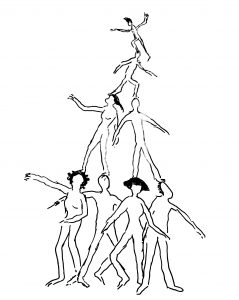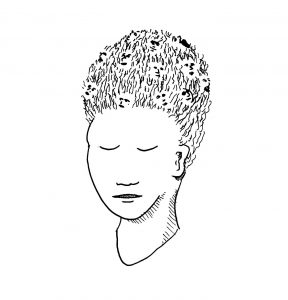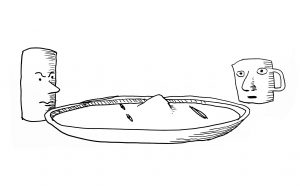Nearly two decades ago, just as war grabbed the world by the throat following the September 11th terrorist attacks, I was serving in the military with a white guy from the Deep South named Rob. He would come to be one of my closest shipmates, and we’ve stayed connected over the years. He’s the same guy today that he was then — light-hearted, pragmatic, facts-driven, sees the best in others.
But a few weeks back, he reached out to me with an uncharacteristically gloomy message: “I am really concerned with everything that’s going on,” he wrote. “We are being torn apart, and race seems to be the main reason. How have we — a black guy and a white guy with different worldviews — managed to keep our friendship alive? Maybe there’s a lesson in it?”

My friend is not alone in his malaise. Many of us feel it. Slightly more than three in four Americans believe the country is not headed in the right direction. Nearly 75 percent say race relations are bad. Over 60 percent say economic inequality is a problem, and national pride has fallen to a record low. An overwhelming majority disapproves of the job our government and elected officials are doing. And perhaps most telling, we see declining trust in each other as the root of the major challenges plaguing the nation.
These sobering figures seem to describe a society whose structural supports have grown rickety. They suggest that we’ve passed some point of no return. Perhaps most of all, they beg the question facing democracies around the world, especially those that are increasingly multiracial and multiethnic: What do we have left that still binds us together?
The answer, from my perspective, is a civil religion.
The concept of civil religion dates back hundreds of years. Every nation has one. Eighteenth century philosopher Jean-Jacques Rousseau conceptualized civil religion as a set of beliefs that define what it means to be a virtuous citizen. But sociologist Robert Bellah gave the thing teeth when he conceived of an American iteration of it in 1967.
The American civil religion is a sociological theory that suggests there’s a semi-religious dimension to civic and public life. Like most religions, it’s a faith expressed through a set of beliefs, symbols, sacraments and rituals that bind unlike people together. The high-minded ideals of equality, liberty, justice and opportunity become the basis for a shared identity consecrated in American cultural cornerstones — in documents like the Declaration of Independence and the Constitution; in rhetoric like Abraham Lincoln’s Gettysburg Address and Martin Luther King, Jr.’s “I Have a Dream” speech; in observances like Independence Day and Memorial Day; in symbols like the flag and the Statue of Liberty; and in rituals like reciting the Pledge of Allegiance and the peaceful transfer of power on Inauguration Day.

An appropriately conceived civil religion establishes the duties of citizenship, provides a transcendent national identity, is accommodating of social diversity and provides a point of allegiance. In effect, by each of us agreeing to become parishioners of sorts of the American civil religion, we have agreed to fight for a common vision of the future and defend each other’s access to the full rights, privileges and protections of citizenship.
But civil religion is not without its risks. Its power has caused many political figures to hijack it, translating it into a tool for exclusion that proclaims that its principles belong only to some. The corrupted version weaponizes things like the flag and national anthem and demands an unquestioning and uncritical fealty. It is why kneeling during the national anthem divides us instead of inspiring a national conversation about race. It is why the wearing of masks becomes a debate about freedom instead of a common sense measure to protect public health. And it is why elections are filled with politicians demonizing one another by claiming their opponents hate America.
Conflicts like these have caused some to wonder whether it’s even possible to establish effective bonds between citizens in large, diverse democracies. It’s certainly trickier. The ancient Greek philosophers thought cities were the ideal size for societies — the word “citizen” is derived from this idea. Perhaps a nation is just too big to govern.
Consider the United States, the world’s third-largest nation. It just isn’t possible for each American to know and feel connected to 330 million others. At times, we’ve tried to deny this obvious fact with misguided claims of a single national identity. One of the country’s founding documents argued as much, declaring that Americans “descended from the same ancestors, speaking the same language, professing the same religion.”
Those words were untrue in 1787, and are even more untrue today. In the United States, Native Americans, the descendants of enslaved Black Africans and immigrants from all corners of the world have contributed a multitude of origins, languages and cultures to help fashion a new nation. Today, one’s American experience remains heavily influenced by race, ethnicity, class and immigration status. Even the coronavirus pandemic has not spurred a sense of national solidarity, and people of color are dying from it at disproportionately high rates.
And yet, my buddy’s question seemed to suggest we had defied the odds: How did we — a black guy and a white guy with different worldviews — manage to form and maintain a friendship that has lasted decades? I think ours is what you would call a civic friendship. A civic friendship is civil religion scaled down to the level of the individual; civic friends, in multitudes, are a civil religion’s flock.

The concept of civic friendship dates back to the Greek philosopher Aristotle. It’s grounded in a shared sense of morality, common values and compassion for one another. It is infused with the understanding that civic friendships — and the collective civil religion they comprise — underpin the strength and integrity of society to the benefit of all. The concept is vital. As Princeton professor Robert George puts it, “Civic friendship is an absolutely indispensable condition of self-government… If you don’t have civic friendship, disagreements turn us into enemies, and you cannot sustain a republic among people who regard themselves as each other’s enemies.”
Being civic friends is hard work. It requires a commitment from the citizenry to do for each other so that all of us can access the full rights and privileges of citizenship. There have always been — and will always be — well-resourced efforts to prevent this from happening by those who hold onto power by undermining a solidarity that crosses lines of race, class, ethnicity, region and religion. But if we are to leave a functioning, stable and just democracy to future generations, establishing and maintaining these civic friendships is our only option.
The task may not be as daunting as it sounds. Even amid all the division broadcast across traditional and social media, most of us want similar things from our society. We want to be treated equally. We want to be included and respected. We want access to opportunities and to feel safe in our communities. We want our institutions and systems to be fair and just. And if government derives its power from our consent, then we have the ability to make our country more unified if we are willing to focus on what we have in common so we can work through the areas where we differ.
I had no epiphanies for Rob. But I did have some reasons to be hopeful to share with him. I told him that as disconnected as people may feel from one another, more than half of us are optimistic about the future. We agree on what it means to be a good citizen and the democratic values that should define our nation. I told him that if we had a lesson for others, it is the central role that a kind of friendship plays in ensuring we see each other’s better angels.
“Take heart, my friend,” I concluded. “If we’re willing to do the hard work of introspection, it’ll be clear that we are not divided.”


